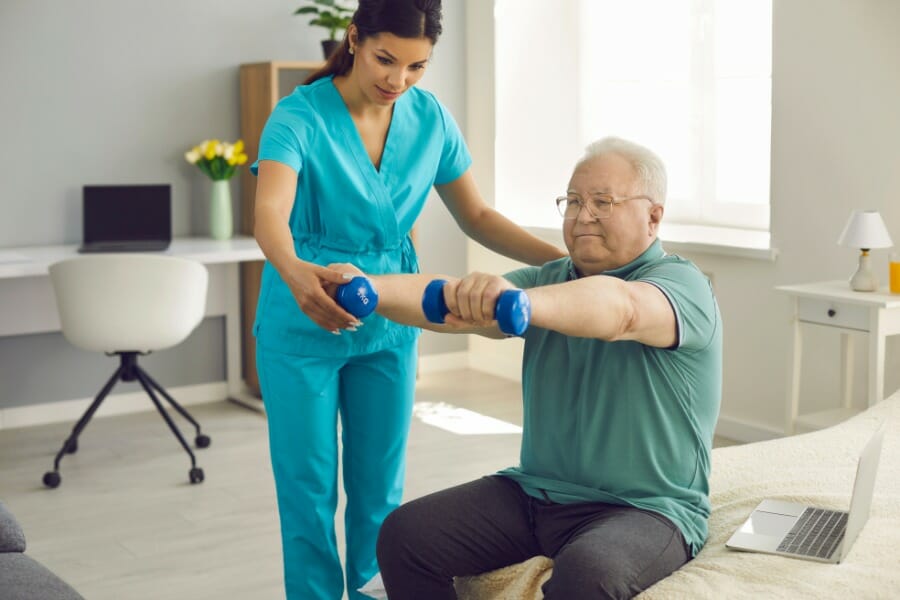Elder Care Assistance: What’s Available?
If you or someone you know needs assistance provided in their home you should know help is available.
Elder care assistance can be provided for your loved one so that you can have peace of mind. Knowing they are being taken care of with compassionate professional attention will allow you to continue your daily schedule without worrying.
Understanding elder care assistance is the first step in finding the right support for your loved one. Federal and state programs, community resources and services, health care and insurance options, long-term care and assisted living, financial assistance and support, and laws and regulations are all important areas to explore.
By learning about these options, families can make informed decisions about the care of their elderly loved ones.
Key Takeaways
- Elder care assistance is a complex issue that requires careful consideration and research.
- Federal and state programs, community resources and services, health care and insurance options, long-term care and assisted living, financial assistance and support, and laws and regulations are all important areas to explore when seeking elder care assistance.
- By understanding the available resources, families can make informed decisions about the care of their elderly loved ones.
What is Elder Care Assistance?

Elder care assistance is a vital resource for older adults who need help with daily living activities, medical care, and financial support. As people age, they may require more assistance with tasks that were once easy to manage. Elder care assistance can provide a range of services to help older adults maintain their quality of life and independence.
There are many types of elder care assistance available, including:
- In-home care services
- Assisted living facilities
- Nursing homes
- Adult day care programs
- Respite care services
- Financial assistance programs
Each of these types of assistance has its own benefits and drawbacks, depending on the individual needs of the older adult. For example, in-home care services can provide personalized care in the comfort of the older adult’s own home, while nursing homes may provide more intensive medical care for those with complex health needs.
Financial assistance programs can also be an important resource for older adults who may be struggling to make ends meet. These programs can provide assistance with food, housing, medical care, and other essential expenses.
It’s important to note that eligibility for elder care assistance programs may vary depending on factors such as age, income, and health status. Older adults and their families should research the various programs available in their area to determine which ones they may be eligible for.
What Elder Care Assistance Provides

NurseRegistry has the ability to match you with a professional nurse who will care for your loved one in the comfort of his or her own home. They understand how all people have different needs and different personalities that is why they are extremely careful with their matches so the nurse and the patient are comfortable with each other and can develop a caring and respectful companionship. Their nurses are fully licensed to help with:
* Medical management to ensure any and all medicines are taken properly
* Handling IV therapy, infusions and taking blood
* Feeding tubes
* Urinary catheters
* Airway management including oxygen therapy
* Hospice and palliative care
* Almost any medical need of an in-home patient requiring medical attention
NurseRegistry understands that the need for dignified and discreet care of your loved one is the most important piece of mind care you and they deserve. Elder care assistance will also help your loved one retain their self-worth by being in the home they are most comfortable in with surroundings that they recognize and need to retain a quality of life.
Federal and State Programs
IN THIS ARTICLE
There are several federal and state programs available to seniors that offer financial assistance, healthcare, and other support services. These programs are designed to help seniors live independently and improve their quality of life.
One such program is the Administration on Aging (AoA), a federal agency that provides funding to states for a range of services that support older adults, including nutrition programs, caregiver support, and transportation services. The AoA also operates the Eldercare Locator, a public service that connects seniors and their families to services available in their communities.
Another important program is Medicare, a federal health insurance program that helps seniors pay for medical care. It covers hospital stays, doctor visits, and other services that seniors need. There are also several programs that can help seniors pay for Medicare costs, such as Medicare Savings Programs and Extra Help.
Medicaid is a joint federal and state program that provides health coverage to low-income Americans. Seniors may qualify for Medicaid if they are disabled or age 65 or older. Unlike Medicare, Medicaid covers various types of long-term care and home- and community-based care services. However, applicants must meet stringent financial requirements to qualify.
In addition to these programs, seniors may also be eligible for pension benefits. The U.S. government offers several pension programs for veterans, federal employees, and their survivors. State governments may also offer pension plans for public employees.
Length of service
The length of service is determined by you and your loved one. They will be there for you whether it is temporary to recover from an injury or surgery procedure to long term. Quality professional care is available if you only need to cover time for an existing nurse who needs time off. They can even provide you with 24 hour care, seven days a week. Their large data base of nurses is filled with licensed and insured RNs and LVNs who have had relevant work experience in elder care assistance.
They will provide you with a caring and knowledgeable nurse who can meet all medical needs as well as understand the pain and discomforts your loved one is suffering. You will have a sense of relief knowing that the best possible care and attention is being provided when you cannot be there for them.
Community Resources and Services
When it comes to elder care assistance, community resources and services play a crucial role in helping seniors access the support they need. Whether it’s finding housing, accessing healthcare, or simply getting a ride to the grocery store, community resources and services can make a big difference in the lives of older adults.
One of the key resources available to seniors is the Area Agencies on Aging (AAA). These agencies provide a wide range of services to help seniors and their caregivers, including information and assistance in locating community services, coordinating short-term services for those recovering at home, and providing support for family caregivers.
In addition to the AAA, there are many other community resources and services available to seniors. Volunteer programs, for example, can provide companionship and support to seniors who may be feeling isolated or lonely. Public service programs, such as the Eldercare Locator, can connect seniors and their families to a wide range of resources and services, including transportation, home care, and legal assistance.
Health Care and Insurance Options
When it comes to elder care, understanding health care and insurance options is crucial. Medicare is the primary health insurance coverage for the vast majority of elderly Americans, covering hospital stays, doctor visits, some home health care, hospice care, and preventive services such as vaccinations.
However, Medicare does not cover long-term care, which can be a significant expense for seniors and their families.
To cover long-term care costs, seniors can purchase long-term care insurance, which can help pay for nursing home care, assisted living, and in-home care. However, long-term care insurance can be expensive, and premiums can increase over time. It is essential to research and compare different insurance plans to find the best coverage and price.
Another option for covering long-term care costs is Medicaid, a joint federal and state program that helps low-income individuals and families pay for medical care. Medicaid covers long-term care services, but eligibility requirements vary by state and can be complicated. Seniors can also use a Medicaid planner to help them navigate the application process.
Prescription drug costs can also be a significant expense for seniors. Medicare Part D is a prescription drug plan that helps cover the cost of prescription drugs. Seniors can choose from a variety of plans to find the best coverage and price for their needs.
Long-Term Care and Assisted Living

When it comes to elder care, long-term care and assisted living are two options that can provide seniors with the support they need to live independently.
Long-term care is typically provided in a residence or home setting and is designed for seniors who require around-the-clock care and assistance with daily tasks. Assisted living, on the other hand, is designed for seniors who are still able to live independently but require some assistance with daily tasks.
Long-term care facilities are staffed with trained professionals who can provide seniors with medical care, personal care, and other support services. These facilities can be expensive, but some seniors may be eligible for financial assistance through Medicaid or other programs.
Assisted living communities provide seniors with a private apartment or suite, as well as access to communal spaces and services like meals, housekeeping, and transportation. These communities can be a great option for seniors who want to maintain their independence but need some extra support.
Seniors who are considering long-term care or assisted living should take the time to research their options and find a facility or community that meets their needs and preferences. It’s important to tour facilities, ask questions, and talk to current residents to get a sense of what life is like in each setting.
Nurses Looking to Provide In-Home Elder Care Assistance
NurseRegistry always has openings for nurses who are capable of providing professional and compassionate care for elder care assistance. Our mission is to match the best nurses to our client’s needs and have a wide range of opportunities available for both RNs and LVNs who have the patience, knowledge, and dedication to take care of individuals seeking in-home care. There are also work opportunities with:
* And many other medical facilities
Your previous nursing background is sure to make you a good candidate if you have the ability to be discreet, caring, understanding and above all the desire to provide quality elder care assistance. A background check is required which will help us to place you with the best match possible to provide care. Contact NurseRegistry today at 650-462-1001 or apply online at NurseRegistry.com/applicants.
If your senior loved one needs in-home care, we can match you with a nurse best able to fit your needs. Visit us online or call 650-462-1001 to speak with a Care Coordinator.
Clinical outcomes of home health care
Advantages of providing in-home care
Frequently Asked Questions
What happens to the elderly who have no money?
Elderly individuals who have no money may be eligible for government assistance programs such as Medicaid, which provides healthcare coverage for low-income individuals. Additionally, some states offer programs that provide financial assistance to low-income seniors for housing, food, and other basic needs.
How to contact social services for the elderly?
To contact social services for the elderly, individuals can contact their local Area Agency on Aging. The Area Agency on Aging provides information and assistance to seniors and their families on a variety of topics, including healthcare, housing, and financial assistance.
What is the most requested support service for the elderly?
The most requested support service for elderly individuals is home care assistance. Home care assistance provides seniors with the support they need to live independently in their own homes. This may include assistance with daily activities such as bathing, dressing, and meal preparation.





